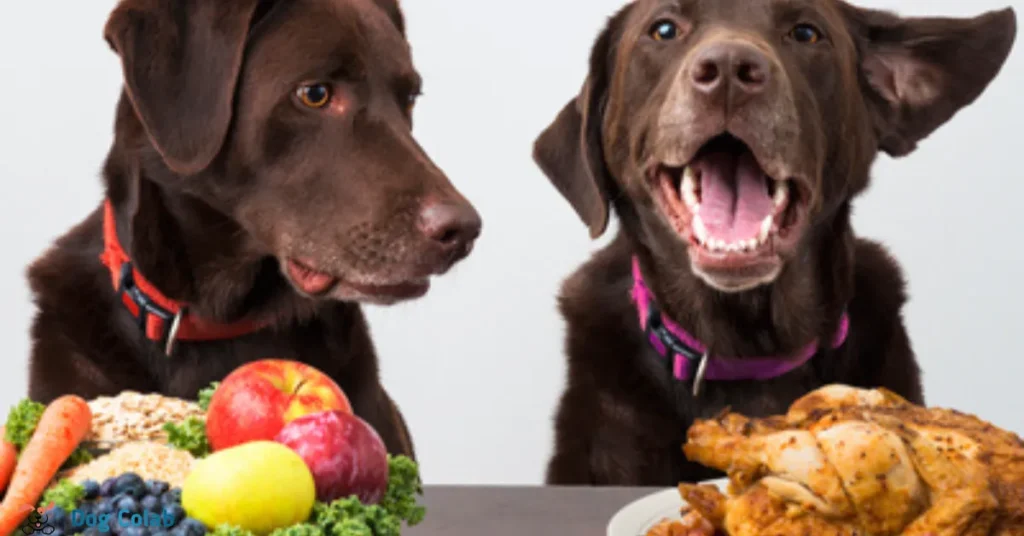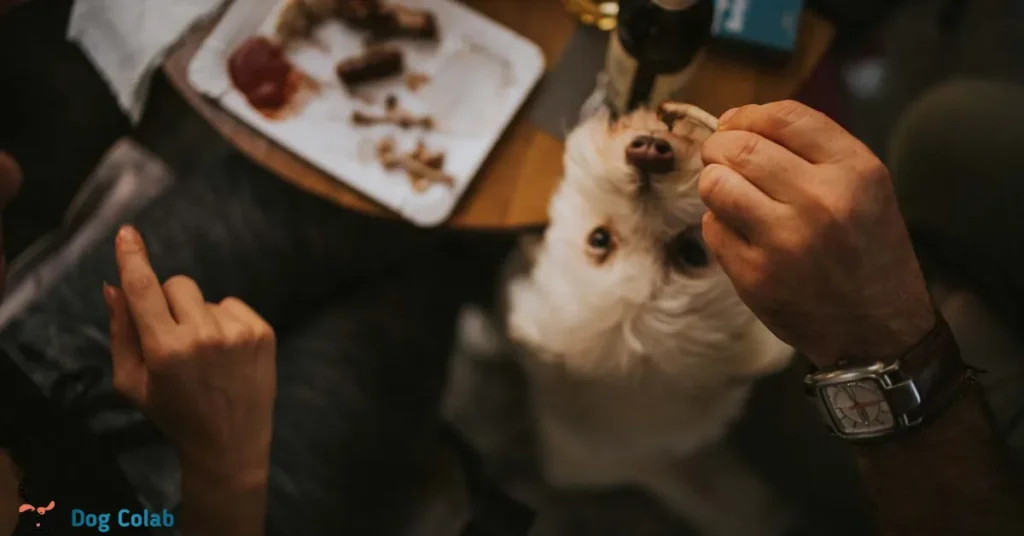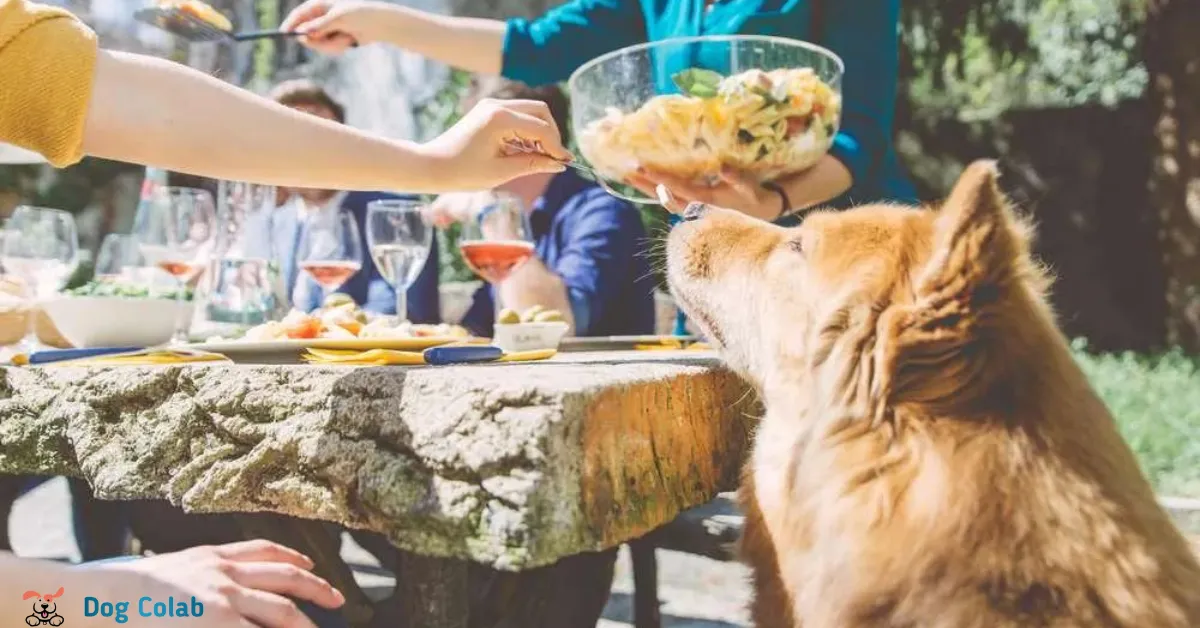Dogs are not just our pets; they are often considered members of the family. It’s only natural that we want to share our food with them from time to time. While sharing food with your furry friend can be a way to bond and show affection, it is essential to understand what foods are safe for dogs and the right way to do it to ensure their health and happiness. So, In this blog post, we will discuss is it ok to share food with your dog and what can dogs eat and not eat.
Is It Ok To Share Food With Your Dog?
It’s generally okay to share some human food with your dog, but you need to be careful and selective. Also, be mindful of portion sizes, as too much human food can upset your dog’s stomach or lead to weight gain. Here are some guidelines to consider what can dogs eat and not eat.
What Food Can Dogs Eat

- Lean Proteins: Lean proteins like cooked chicken, turkey, and beef can be a good source of nutrition for your dog. Make sure the meat is plain, without any seasonings, sauces, or spices. It’s also essential to remove any bones, as they can be a choking hazard.
- Fruits and Vegetables: Many fruits and vegetables are safe for dogs and can be a healthy addition to their diet. Some examples include apples (without seeds), blueberries, carrots, and green beans. These snacks are not only tasty but also provide essential vitamins and fiber.
- Rice and Plain Pasta: Plain, cooked rice and pasta can be suitable for dogs, especially if they have an upset stomach. These bland foods can help soothe digestive issues. Seasonings and sauces should not be added.
- Peanut Butter: Most dogs love peanut butter, and it can be an excellent source of protein for them. Just make sure the peanut butter you offer is free from xylitol, a sweetener that is toxic to dogs.
- Small Treats: You can buy dog-specific treats from pet stores or make your own at home. These treats are specially formulated to be safe and healthy for dogs and are a great way to reward good behavior.
What Foods Can Dogs Not Eat

- Chocolate: Chocolate is toxic to dogs, and even a small amount can be dangerous. It contains substances called theobromine and caffeine, which can lead to vomiting, diarrhea, and even seizures in dogs.
- Grapes and Raisins: Raisins and grapes can cause kidney failure in dogs. It’s best to avoid them entirely.
- Onions and Garlic: Onions and garlic, whether raw, cooked, or in powdered form, can be harmful to dogs. They can cause damage to a dog’s red blood cells and lead to anemia.
- Avocado: Avocado contains a substance called persin, which can be toxic to dogs in large amounts. It’s best not to feed them any avocado.
- Bones: While some people give their dogs bones as a treat, it’s generally not recommended. Cooked bones can splinter and cause choking, blockages, or damage to your dog’s digestive tract.
- Spices and Seasonings: Avoid sharing food with your dog if it contains spices, seasonings, or sauces. These can upset their stomach and may be harmful.
Read More:- Why do dogs like milk bones.
Pros and Cons of Feeding Dogs Human Food
Feeding dogs human food can have both pros and cons, depending on how it’s done. Here are some of the advantages and disadvantages.

Pros
- Variety: Feeding your dog small amounts of human food can provide variety in their diet, which can be appealing to some dogs.
- Bonding: Sharing food with your dog can create a bonding experience between you and your pet, especially if you use food as a reward during training or special occasions.
- Treats: Some human foods can serve as healthier alternatives to commercial dog treats, which may contain additives and fillers. For example, small pieces of plain, cooked chicken or vegetables can be a low-calorie treat option.
- Nutritional benefits: Certain human foods, like lean meats, plain vegetables, and some fruits, can offer nutritional benefits and additional vitamins and minerals when given in moderation.
Cons
- Health risks: Feeding dogs human food can pose health risks, as many human foods are toxic to dogs. This can lead to poisoning, digestive issues, or other health problems.
- Imbalanced nutrition: Human food is not formulated to meet a dog’s nutritional needs. Over time, feeding too much human food or the wrong types of food can lead to nutrient imbalances, obesity, and other health issues.
- Begging behavior: If dogs are consistently given food from the table or while you’re eating, they may develop begging behavior, which can be undesirable and disruptive.
- Weight gain and obesity: High-calorie human foods can contribute to weight gain and obesity in dogs, which can lead to various health problems, including joint issues and diabetes.
- Allergies and sensitivities: Dogs can be allergic or sensitive to certain human foods, leading to adverse reactions such as itching, vomiting, or diarrhea.
- Behavioral problems: If dogs learn that they can obtain human food by begging or taking it from counters or tables, it can lead to undesirable behavior.
- Risk of choking and blockages: Some human foods, like bones or small, hard items, can pose a choking hazard or cause intestinal blockages in dogs.
Recommended Also Read:- Why is my dog eating slower than normal.
Can Dogs Eat Human Food Everyday?
While it’s okay to share some human food with your dog occasionally, it’s not a good idea to feed them human food every day. Dogs have specific nutritional needs that are different from humans, and feeding them human food regularly can lead to health problems like obesity, digestive issues, and nutrient imbalances.
It’s best to stick to a balanced and specially formulated dog food that meets their dietary requirements. If you want to give your dog treats or small amounts of human food as an occasional treat, make sure it’s safe and not harmful to them.
Conclusion “Is It Ok To Share Food With Your Dog”
It is generally okay to share some food with your dog in moderation as long as you stick to safe options and avoid potentially harmful ingredients. Always prioritize your dog’s health and consult your veterinarian if you have any questions or concerns about their diet.
Sharing food with your furry companion can be a delightful experience, but it should be done with their well-being in mind.
NOTE:- More information can be found by clicking this link.
FAQs
1. Is it safe to share spoon with dog?
Sharing a spoon with your dog is generally not safe. It can transfer germs and bacteria between you and your dog, potentially causing health issues. It’s best to use separate utensils.
2. Should you eat around your dog?
Yes, it’s generally okay to eat around your dog but avoid sharing human food during meals to prevent them from developing begging habits and potential health issues.
3. Do dogs get upset when you dont share your food?
Dogs might feel disappointed when you don’t share food, as they may associate your mealtime with treats. However, they don’t experience human-like emotions of upsetness.

